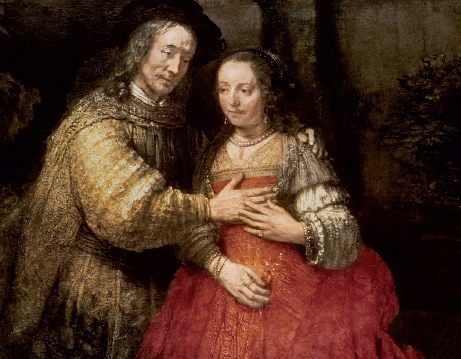Individuals in Society: Glückel of Hameln

In 1690 a Jewish widow in the small German town of Hameln in Lower Saxony sat down to write her autobiography. She wanted to distract her mind from the terrible grief she felt over the death of her husband and to provide her twelve children with a record. She told them that she was writing her memoirs “so you will know from what sort of people you have sprung, lest today or tomorrow your beloved children or grandchildren came and know naught of their family.” Out of her pain and heightened consciousness, Glückel (1646–
She was born in Hamburg two years before the end of the Thirty Years’ War. In 1649 the merchants of Hamburg expelled the Jews, who moved to nearby Altona, then under Danish rule. When the Swedes overran Altona in 1657–
When Glückel was “barely twelve,” her father betrothed her to Chayim Hameln, and they married when she was fourteen. She describes him as “the perfect pattern of the pious Jew,” a man who stopped his work every day for study and prayer, fasted, and was scrupulously honest in his business dealings. Only a few years older than Glückel, Chayim earned his living dealing in precious metals and in making small loans on pledges (pawned goods). This work required constant travel to larger cities, markets, and fairs, often in bad weather, always over dangerous roads. Chayim consulted his wife about all his business dealings. As he lay dying, a friend asked if he had any last wishes. “None,” he replied. “My wife knows everything. She shall do as she has always done.” For thirty years Glückel had been his friend, full business partner, and wife. They had thirteen children, twelve of whom survived their father, eight then unmarried. As Chayim had foretold, Glückel succeeded in launching the boys in careers and in providing dowries for the girls.
Glückel’s world was her family, the Jewish community of Hameln, and the Jewish communities into which her children married. Her social and business activities took her across Europe, from Amsterdam to Berlin, from Danzig to Vienna; thus her world was far from narrow or provincial. She took great pride that Prince Frederick of Cleves, later king of Prussia, danced at the wedding of her eldest daughter. The rising prosperity of Chayim’s businesses allowed the couple to maintain up to six servants.
Glückel was deeply religious, and her culture was steeped in Jewish literature, legends, and mystical and secular works. Above all, she relied on the Bible. Her language, heavily sprinkled with scriptural references, testifies to a rare familiarity with the Scriptures.
Students who wish to learn about seventeenth-
Source: The Memoirs of Glückel of Hameln (New York: Schocken Books, 1977).
QUESTIONS FOR ANALYSIS
- Consider the ways in which Glückel of Hameln was both an ordinary and an extraordinary woman of her times. Would you call her a marginal or a central person in her society? Why?
- How might Glückel’s successes be attributed to the stabilizing force of absolutism in the seventeenth century?

DOCUMENT PROJECT
What factors shaped life for European Jews in the early modern era? Read excerpts from Glückel of Hameln’s memoirs and other accounts of Jewish life, and then complete a quiz and writing assignment based on the evidence and details from this chapter. See Document Project for Chapter 18